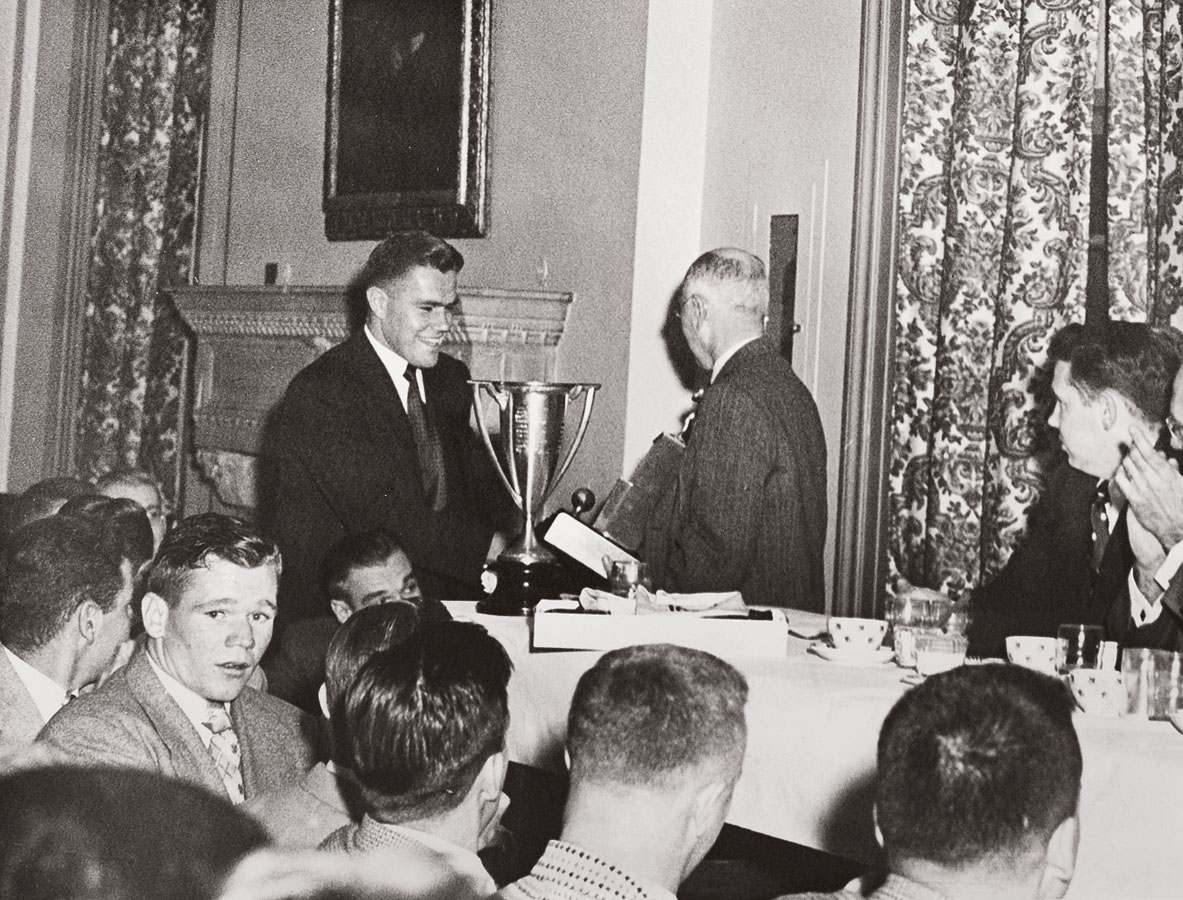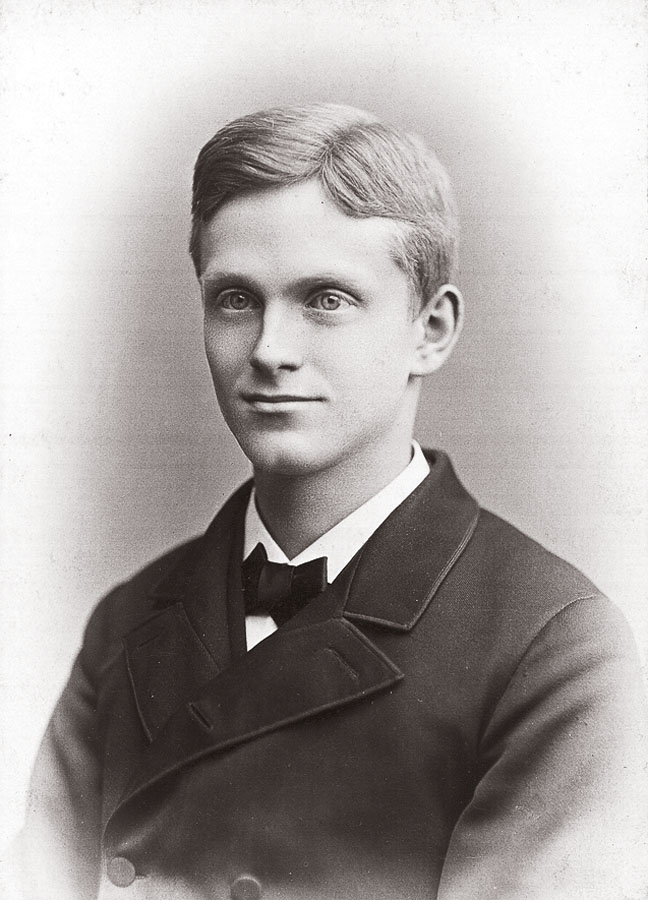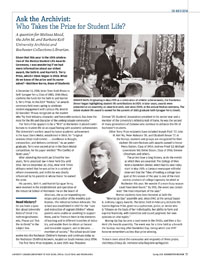In Review
 DINNER DAYS: Originating in May 1925 as a celebration of athletic achievements, the Dandelion Dinner began highlighting student
life contributions in 1929. In later years, awards were presented at an assembly, an awards brunch, and since 2009, at the
annual Rockys ceremony. The oldest student life award is named for the parents of 1883 graduate Seth Sprague Terry (below).
(Photo: University Libraries/Department of Rare Books, Special Collections, and Preservation)
DINNER DAYS: Originating in May 1925 as a celebration of athletic achievements, the Dandelion Dinner began highlighting student
life contributions in 1929. In later years, awards were presented at an assembly, an awards brunch, and since 2009, at the
annual Rockys ceremony. The oldest student life award is named for the parents of 1883 graduate Seth Sprague Terry (below).
(Photo: University Libraries/Department of Rare Books, Special Collections, and Preservation)Need History?
Do you have a question about University history? Email it to rochrev@rochester.edu. Please put “Ask the Archivist” in the subject line.
Given that this year is the 10th celebration of the Rockys Student Life Awards Ceremony, I was wondering if we had more information about our oldest award, the Seth H. and Harriet S. Terry Prize, which I think began in 1928. What do we know of the prize and its namesakes?—Matthew Burns, Dean of Students
A December 13, 1928, letter from Rush Rhees to Seth Sprague Terry, Class of 1883, 1886 (Mas), confirms the funds for the Seth H. and Harriet S. Terry Prize. At the 2019 “Rockys,” an awards ceremony held every spring to celebrate student engagement with campus life, Beatriz Gil Gonzàlez ’19 was recognized as the student who “by their industry, character, and honorable conduct, has done the most for the life and character of the undergraduate community.”
The Terry Prize appears to be a “first” at Rochester: it placed contributions to student life on an equal footing with academic achievement. The University’s earliest award to honor academic achievement is the Isaac Davis Medal, established in 1864, for “original orations (that) shall exhibit . . . excellence in thought, composition, and delivery combined.” As an undergraduate, Terry won second prize in the Davis Medal competition, for his paper entitled “The Conflict of State Laws.”
 (Photo: University Libraries/Department of Rare Books, Special Collections, and Preservation)
(Photo: University Libraries/Department of Rare Books, Special Collections, and Preservation)After attending Harvard Law School for two years, Terry practiced law in New York City until 1914. Terry’s December 20, 1932, New York Times obituary noted that he was active in a variety of reform movements, and in this he was clearly influenced by his parents in whose honor he named the prize.
His parents, Seth H. and Harriet Sprague Terry, were involved in the establishment and operation of the Industrial School of Rochester: he on the board of directors, she as corresponding secretary and as editor of the monthly publication, The Industrial School Advocate. The school was established in 1857 for the “care and instruction of vagrant children” whose parents were unable or unwilling to support them, and to “instruct them in the elements of learning and in different branches of industry, and enable them to obtain an honest and honorable support, and to become . . . members of society.” The school would later evolve into the Rochester Children’s Nursery and continues today as the Rochester Childfirst Network, located on South Avenue since 1954.
The first Terry Prize recipient, in June 1929, was Theodore Zornow ’29. Students’ Association president in his senior year and a member of the University’s Athletics Hall of Fame, he was the second of many generations of Zornows who continue to enhance the life of Rochester’s students.
Other Terry Prize recipients have included Joseph Platt ’37, John M. Keil ’46, Peter Nabozny ’05, and Elizabeth Beson ’17. At the Rockys, students and groups are recognized for their student life contributions with awards named to honor Percy Dutton, Class of 1904; Andrew Fried ’62; Michael Lowenstein ’60; Delno Sisson, Class of 1916; Simeon Cheatham; and others.
The prizes have a long history, as do the events at which they are awarded. The College of Men held a Dandelion Dinner, which had its own rocky start in May 1925: a Campus newspaper editorial observed that the “idea of holding a college banquet at this season of the year is one of the most asinine products of college ingenuity heralded at Rochester this year. We wonder if a more busy season could have been found.” By 1931, the event was considered “the most important of the year.”
Women students have been honored at both the “Moving-Up Day” assembly and, since 1947, at the annual Susan B. Anthony Legacy Awards. The latter, held in February, includes the Fannie Bigelow Prize, given to a sophomore, junior, or senior who is “chosen on the basis of her individuality, her ability to form and express fearlessly, with conviction and sound judgment, her own opinions on vital topics.”
Moving-Up Day became a coed event in the 1960s, and then a Student Life Awards assembly. The event was for a time held as a brunch the Sunday morning after Dandelion Day, timing which one 1997 honoree remembers as less than prize winning.
To learn more about the namesakes and recipients of these prizes, visit https://rbscp.lib.rochester.edu/blog/ATA-Spring2019.

